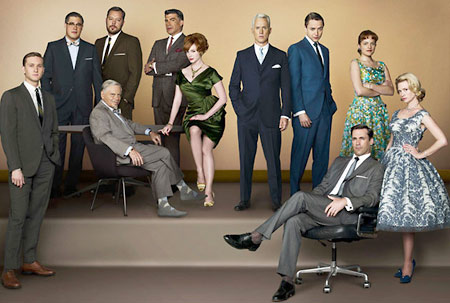“Mad Men” explored in new UC Berkeley course
This semester, a DeCal class discusses themes in the wildly popular series "Mad Men."
October 13, 2010

The cast of the TV series "Mad Men," the subject of a student-run DeCal course at Berkeley.
The wildly popular TV show “Mad Men” is the subject of a new course this fall at the University of California, Berkeley.
The two-unit English course in the campus’s DeCal program focuses on the “thematically, symbolically, and historically rich television series,” which focuses on Madison Avenue advertising executive Don Draper and his life in New York City during the 1960s. The class is being taught by two students who are huge fans of the show.
After watching “Mad Men” season after season for the past four years, course co-facilitators Katie Dowd, a fourth year English major, and Annie Powers, a fourth year history major, said they realized the plot lent itself to much deeper discussion and thought.
“Historically and thematically, there is a lot going on that you can delve into in a classroom setting,” Powers said.
DeCal courses at UC Berkeley provide the platform for students to explore these atypical subjects. The student-run education program lets students create and facilitate their own classes on a variety of subjects, many of which are not addressed in the traditional curriculum. Topics this semester range from the “Sociology of Seinfeld” to longboarding.
“Mad Men” themes being covered by Dowd and Powers include contemporary culture; politics of the 1960s; the role of women, class and society; and the family unit. Powers said they selected these topics by watching each season in its entirety and focusing on the general themes that occurred throughout the series. From there, she said, they narrowed down subjects to particular episodes.

Actor Jon Hamm as "Mad Men" protagonist Don Draper.
Each class topic has a corresponding episode and supplementary readings, including “The Feminine Mystique” by Betty Friedan and Frank O’ Hara’s “Meditations in an Emergency.” Dowd and Powers begin each class with a short lecture, followed by the screening of clips from the featured episode that week. An open discussion follows.
“We try to stay on topic, but the class is about interacting with people,” Dowd said. “We focus on what the students have to say.”
Dowd’s and Powers’ enthusiasm for the show and for television, in general, is obvious throughout their lectures. Each theme presented is accompanied by detailed background. In a recent class about the culture of the 1960s, Dowd discussed popular TV shows like “The Defenders” as well as Bob Dylan, Marilyn Monroe, the movie “Beach Party,” and art by Mark Rothko.
Dowd and Powers said they want to ensure that the class has a solid understanding of each day’s topic before integrating “Mad Men” into the discussion.
At its core, the class is geared toward fans of “Mad Men” as well as those familiar with the show who are looking to discuss and delve into the material on a deeper level, Powers said. Both facilitators said they hope that students will take more from the class than just a better understanding of the series.
“I think a lot of people throw away television as just entertainment,” Dowd said. “I think shows like ‘Mad Men’ prove that it can be more than entertainment. It can be thought-provoking. It can say something about our culture.”
Dowd added that she wants people to understand that watching a TV show can be more than just a passive activity — especially when it comes to a show like “Mad Men,” where there is an incredible amount of investment and research put into every episode by the series’ creator.
Powers said she wants students to view the show as more than just a piece of pop culture, more than just television.
“It’s a reflection of our times … you can make great high-art in television,” she said.